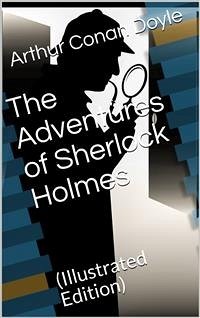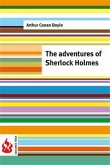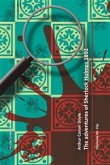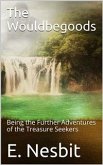The Adventures of Sherlock Holmes is a collection of twelve short stories by Arthur Conan Doyle, first published on 14 October 1892. It contains the earliest short stories featuring the consulting detective Sherlock Holmes, which had been published in twelve monthly issues of The Strand Magazine from July 1891 to June 1892. The stories are collected in the same sequence, which is not supported by any fictional chronology. The only characters common to all twelve are Holmes and Dr. Watson and all are related in first-person narrative from Watson's point of view.
In general the stories in The Adventures of Sherlock Holmes identify, and try to correct, social injustices. Holmes is portrayed as offering a new, fairer sense of justice. The stories were well received, and boosted the subscriptions figures of The Strand Magazine, prompting Doyle to be able to demand more money for his next set of stories. The first story, "A Scandal in Bohemia", includes the character of Irene Adler, who, despite being featured only within this one story by Doyle, is a prominent character in modern Sherlock Holmes adaptations, generally as a love interest for Holmes. Doyle included four of the twelve stories from this collection in his twelve favourite Sherlock Holmes stories, picking "The Adventure of the Speckled Band" as his overall favourite.
All of the stories within The Adventures of Sherlock Holmes are told in a first-person narrative from the point of view of Dr. Watson, as is the case for all but four of the Sherlock Holmes stories. The Oxford Dictionary of National Biography entry for Doyle suggests that the short stories contained in The Adventures of Sherlock Holmes tend to point out social injustices, such as "a king's betrayal of an opera singer, a stepfather's deception of his ward as a fictitious lover, an aristocratic crook's exploitation of a failing pawnbroker, a beggar's extensive estate in Kent." It suggests that, in contrast, Holmes is portrayed as offering a fresh and fair approach in an unjust world of "official incompetence and aristocratic privilege". The Adventures of Sherlock Holmes contains many of Doyle's favourite Sherlock Holmes stories. In 1927, he submitted a list of what he believed were his twelve best Sherlock Holmes stories to The Strand Magazine. Among those he listed were "The Adventure of the Speckled Band" (as his favourite), "The Red-Headed League" (second), "A Scandal in Bohemia" (fifth) and "The Five Orange Pips" (seventh). The book was banned in the Soviet Union in 1929 because of its alleged "occultism", but the book gained popularity in a black market of similarly banned books, and the restriction was lifted in 1940.
Contents
A scandal in Bohemia -- The Red-headed League -- A case of identity -- The Boscombe Valley mystery -- The five orange pips -- The man with the twisted lip -- The adventure of the blue carbuncle -- The adventure of the speckled band -- The adventure of the engineer's thumb -- The adventure of the noble bachelor -- The adventure of the beryl coronet -- The adventure of the Copper Beeches.
In general the stories in The Adventures of Sherlock Holmes identify, and try to correct, social injustices. Holmes is portrayed as offering a new, fairer sense of justice. The stories were well received, and boosted the subscriptions figures of The Strand Magazine, prompting Doyle to be able to demand more money for his next set of stories. The first story, "A Scandal in Bohemia", includes the character of Irene Adler, who, despite being featured only within this one story by Doyle, is a prominent character in modern Sherlock Holmes adaptations, generally as a love interest for Holmes. Doyle included four of the twelve stories from this collection in his twelve favourite Sherlock Holmes stories, picking "The Adventure of the Speckled Band" as his overall favourite.
All of the stories within The Adventures of Sherlock Holmes are told in a first-person narrative from the point of view of Dr. Watson, as is the case for all but four of the Sherlock Holmes stories. The Oxford Dictionary of National Biography entry for Doyle suggests that the short stories contained in The Adventures of Sherlock Holmes tend to point out social injustices, such as "a king's betrayal of an opera singer, a stepfather's deception of his ward as a fictitious lover, an aristocratic crook's exploitation of a failing pawnbroker, a beggar's extensive estate in Kent." It suggests that, in contrast, Holmes is portrayed as offering a fresh and fair approach in an unjust world of "official incompetence and aristocratic privilege". The Adventures of Sherlock Holmes contains many of Doyle's favourite Sherlock Holmes stories. In 1927, he submitted a list of what he believed were his twelve best Sherlock Holmes stories to The Strand Magazine. Among those he listed were "The Adventure of the Speckled Band" (as his favourite), "The Red-Headed League" (second), "A Scandal in Bohemia" (fifth) and "The Five Orange Pips" (seventh). The book was banned in the Soviet Union in 1929 because of its alleged "occultism", but the book gained popularity in a black market of similarly banned books, and the restriction was lifted in 1940.
Contents
A scandal in Bohemia -- The Red-headed League -- A case of identity -- The Boscombe Valley mystery -- The five orange pips -- The man with the twisted lip -- The adventure of the blue carbuncle -- The adventure of the speckled band -- The adventure of the engineer's thumb -- The adventure of the noble bachelor -- The adventure of the beryl coronet -- The adventure of the Copper Beeches.









